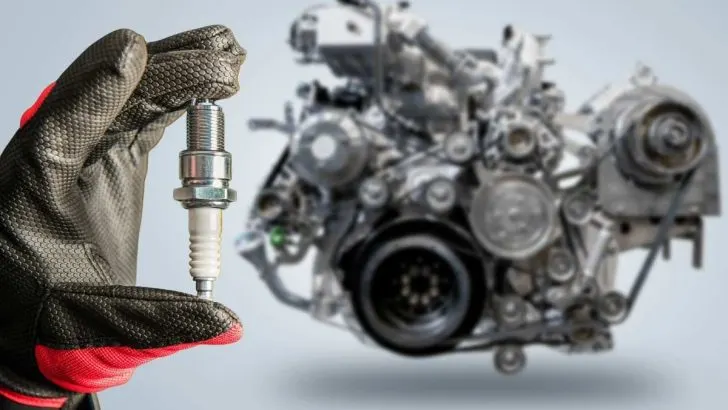Diesel engines are commonly found in various vehicles, ranging from small cars to large trucks and industrial vehicles. However, most people are unaware of how diesel engines operate compared to gasoline engines. One aspect of diesel engines that often leaves people scratching their heads is the absence of spark plugs.
Diesel engines don’t need spark plugs since a diesel engine uses compression and heat to create combustion, unlike a gasoline engine that relies on ignition from the spark plug. That’s because it’s more efficient to combust diesel using heat and pressure.
Keep reading for an in-depth look into how diesel engines operate without spark plugs. I will also examine the components used instead of spark plugs and other aspects unique to diesel engines. By the end of this article, you will have gained better insight into the workings of diesel engines.
How Does a Diesel Engine Ignite Fuel?
Spark plugs are included in a gasoline engine to ignite the fuel source and create combustion. However, diesel engines don’t have any spark plugs. So how does a diesel engine combust fuel without using a spark plug as an ignition source?
A diesel engine ignites fuel by compressing it with the air that runs through the engine’s cylinder. This compression causes the fuel to combust and provides the engine with power. Glow plugs are also added to heat the cylinders, facilitating ignition and compression.
The absence of spark plugs as an ignition source is a fundamental difference between diesel and gasoline engines. If you remove the spark plugs from a gasoline engine, the fuel will not ignite, preventing the engine from operating. However, diesel engines do not require spark plugs to work.
Diesel engines operate by creating high pressure within the cylinders to combust fuel, which causes the temperature in the engine to increase. This increase in temperature allows the diesel engine to run more efficiently, which is a significant benefit of compression over a spark plug to combust fuel in the cylinders.
This increase in efficiency in diesel engines is due to its enhanced thermal energy. The thermal energy of a machine is calculated as a ratio of the engine’s work in relation to the thermal energy present in the fuel source. Diesel engines can output significantly more work from less fuel, making them more fuel-efficient (source).
Do Diesel Engines Have Glow Plugs?
So, now you know that diesel engines never include spark plugs. However, if you look at the engine, you may notice a component where the spark plugs would be in a gasoline engine. So, what are they, and do all diesel engines have them?
Diesel engines have glow plugs. However, glow plugs are usually only found in smaller diesel engines as extra heat is required to facilitate combustion in smaller cylinders. You likely won’t find a glow plug in large diesel engines, as the added warmth is unnecessary for large cylinders.
Small diesel engines will have a small amount of fuel in the cylinder as the air is compressed to cause combustion.
The small amount of fuel will also have to cover a large surface area in relation to the volume of fuel. So, to work well, the fuel should cover a certain amount of the cylinder’s surface, which is more challenging when there is so little fuel in the cylinder that it has to pump in more diesel gasoline constantly.
As a result, the smaller diesel engine is inefficient at combusting, and it won’t reach the proper heat for optimal fuel efficiency. That is where glow plugs come in.
Glow plugs heat the cylinders, which allow for more effective and efficient combustion, even with small amounts of fuel. However, the added warmth provided by glow plugs is unnecessary with larger diesel engines since more fuel can fit in a larger cylinder in relation to the surface area.
If your diesel engine comes fitted with glow plugs and has been damaged, it may take longer to start. Still, you may notice little difference in the diesel engine’s performance in warm weather. However, if you remove the glow plugs entirely, the engine will lose compression, and the vehicle will not start (source).
Do Diesel Engines Have Fuel Injectors?
Diesel engines operate similarly to gasoline engines. However, there are some variations between the two. As you already know, diesel engines typically don’t use spark plugs to operate. But what about other engine components like fuel injectors?
Diesel engines have fuel injectors. In most diesel engines, fuel injectors pump fuel directly into the cylinder. Fuel injectors are often mounted directly onto the cylinders in a diesel engine. In some diesel engines, the fuel injector is where you would find a spark plug in a gas engine.
The fuel injector in a diesel engine pumps fuel to the engine’s cylinders. Once the gasoline enters the cylinder, it’s compressed and sometimes heated, which causes the fuel to combust. That generates power within the diesel engine and allows the vehicle to move.
The fuel injectors in a diesel engine pump a precise amount of fuel at the ideal time to stimulate efficient combustion. This precision makes diesel engines efficient and sustainable.
Still, if the fuel injectors become damaged, the machine will not receive an adequate fuel supply, which will stop the engine from operating as it should.
Fuel injectors are also found in some gasoline and other internal combustion engines. However, you will always find fuel injectors in a diesel engine as they are integral to the engine’s operation.
Final Thoughts
Diesel engines operate in a slightly different way from gasoline engines. The fuel is mixed with air in a gasoline engine and then ignited by a spark plug. That triggers a controlled explosion that powers the engine. However, in a diesel engine, this is not the case.
Diesel engines inject fuel into pressurized air in the cylinder of the machine. This air and fuel are then compressed, causing it to combust, generating power for the engine. Larger diesel engines use glow plugs instead of spark plugs to warm the cylinders to help the combustion process.

